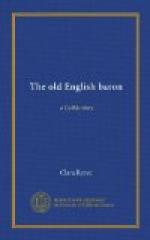The first that entered the field, was Sir Philip Harclay, knight, armed completely, excepting his head-piece; Hugh Rugby, his esquire, bearing his lance; John Barnard, his page, carrying his helmet and spurs; and two servants in his proper livery. The next came Edmund, the heir of Lovel, followed by his servant John Wyatt; Zadisky, followed by his servant.
At a short distance came the Lord Clifford, as judge of the field, with his esquire, two pages, and two livery-servants; followed by his eldest son, his nephew, and a gentleman his friend, each attended by one servant; He also brought a surgeon of note to take care of the wounded.
The Lord Graham saluted them; and, by his order, they took their places without the lists, and the trumpet sounded for the challenger. It was answered by the defendant, who soon after appeared, attended by three gentlemen his friends, with each one servant, beside his own proper attendants.
A place was erected for the Lord Clifford, as judge of the field; he desired Lord Graham would share the office, who accepted it, on condition that the combatants should make no objection, and they agreed to it with the greatest courtesy and respect. They consulted together on many points of honour and ceremony between the two combatants.
They appointed a marshal of the field, and other inferior officers, usually employed on these occasions. The Lord Graham sent the marshal for the challenger, desiring him to declare the cause of his quarrel before his enemy. Sir Philip Harclay then advanced, and thus spoke:
“I, Philip Harclay, knight, challenge Walter, commonly called Lord Lovel, as a base, treacherous, and bloody man, who, by his wicked arts and devices, did kill, or cause to be killed, his kinsman, Arthur Lord Lovel, my dear and noble friend. I am called upon, in an extraordinary manner, to revenge his death; and I will prove the truth of what I have affirmed at the peril of my life.”
Lord Graham then bade the defendant answer to the charge. Lord Lovel stood forth before his followers, and thus replied:
“I, Walter, Baron of Lovel, do deny the charge against me, and affirm it to be a base, false, and malicious accusation of this Sir Philip Harclay, which I believe to be invented by himself, or else framed by some enemy, and told to him for wicked ends; but, be that as it may, I will maintain my own honour, and prove him to be a false traitor, at the hazard of my own life, and to the punishment of his presumption.”
Then said the Lord Graham, “will not this quarrel admit of arbitration?”
“No,” replied Sir Philip; “when I have justified this charge, I have more to bring against him. I trust in God and the justice of my cause, and defy that traitor to the death!”
Lord Clifford then spoke a few words to Lord Graham, who immediately called to the marshal, and bade him open the lists, and deliver their weapons to the combatants.




